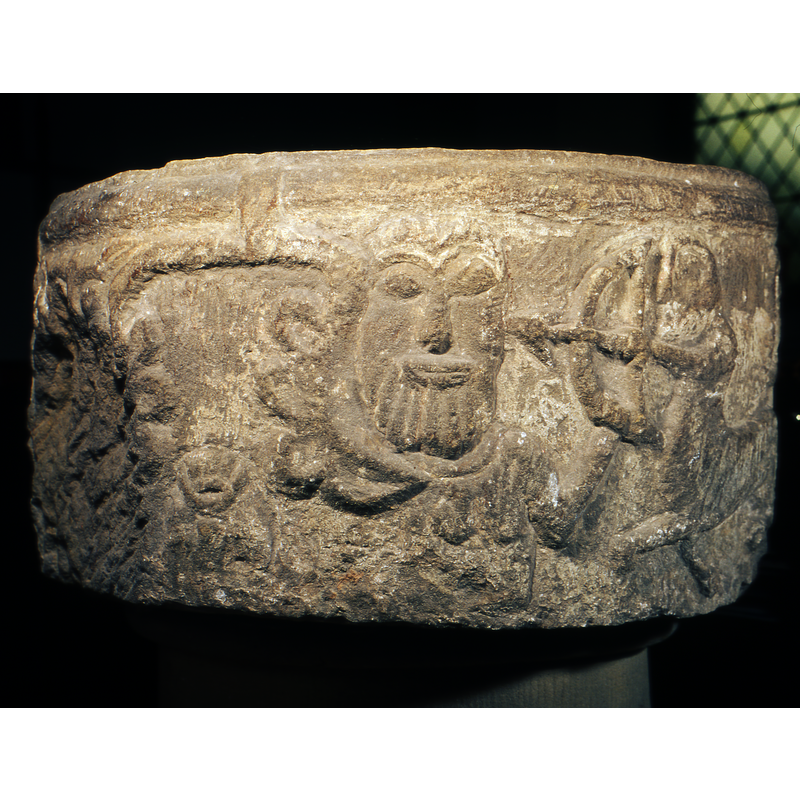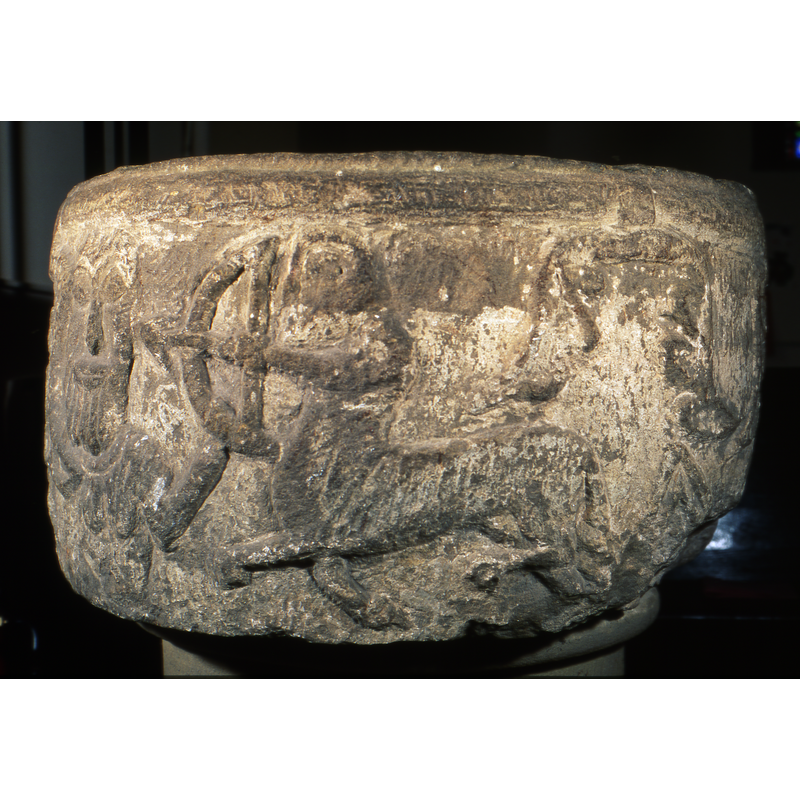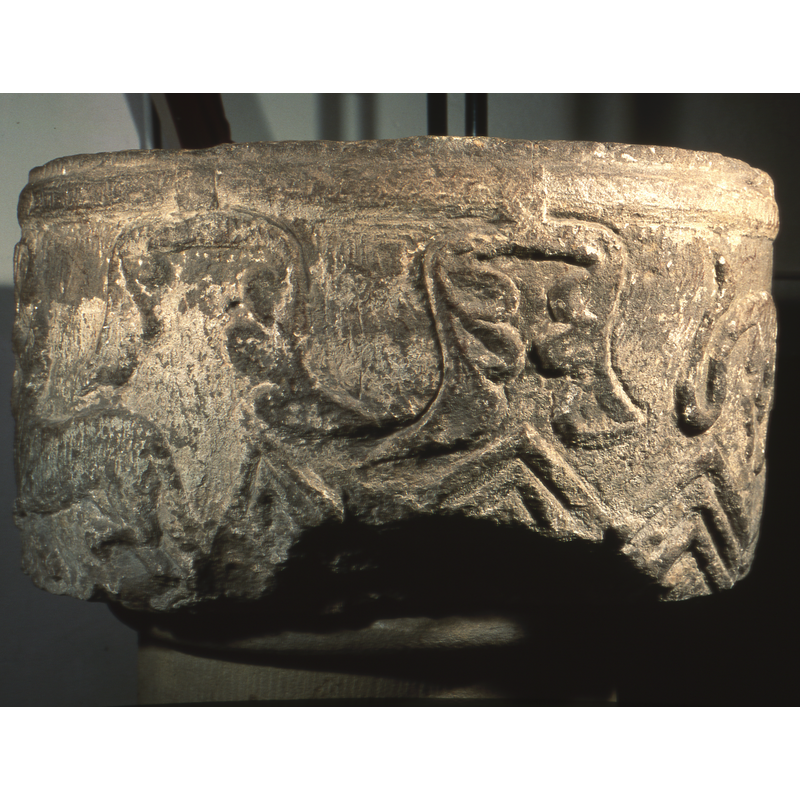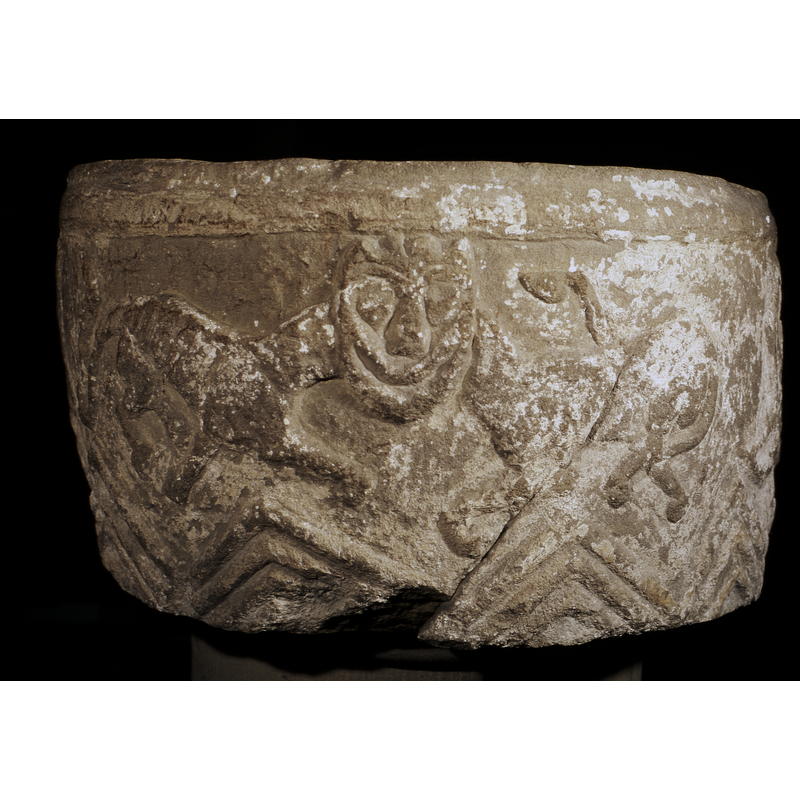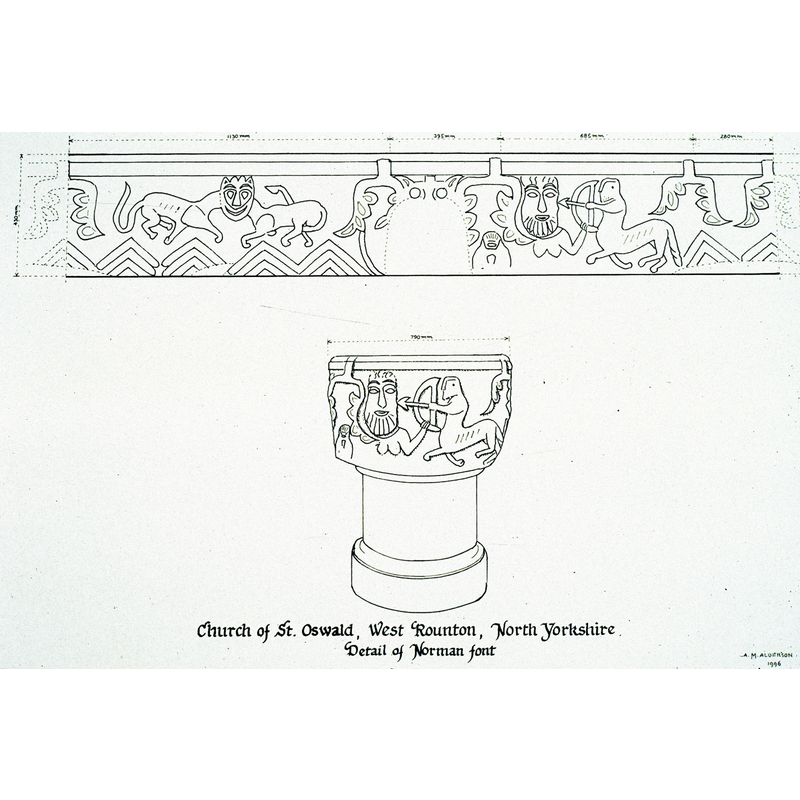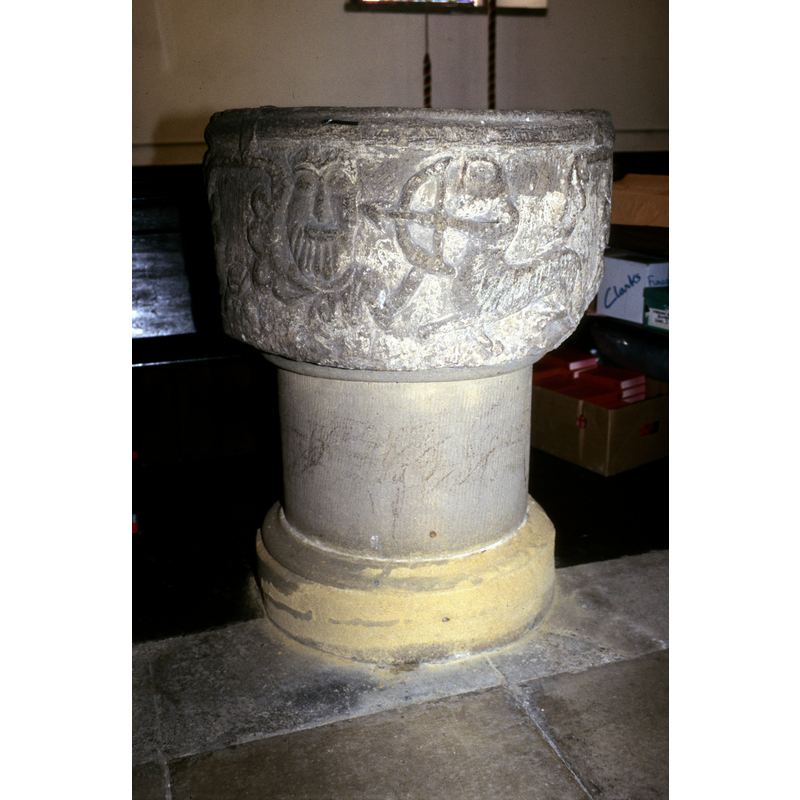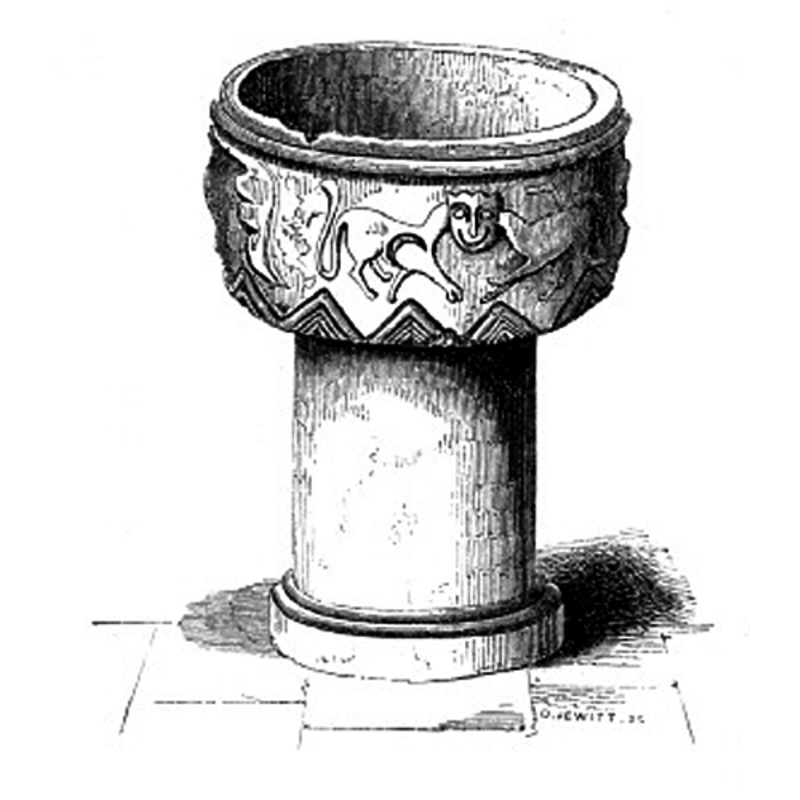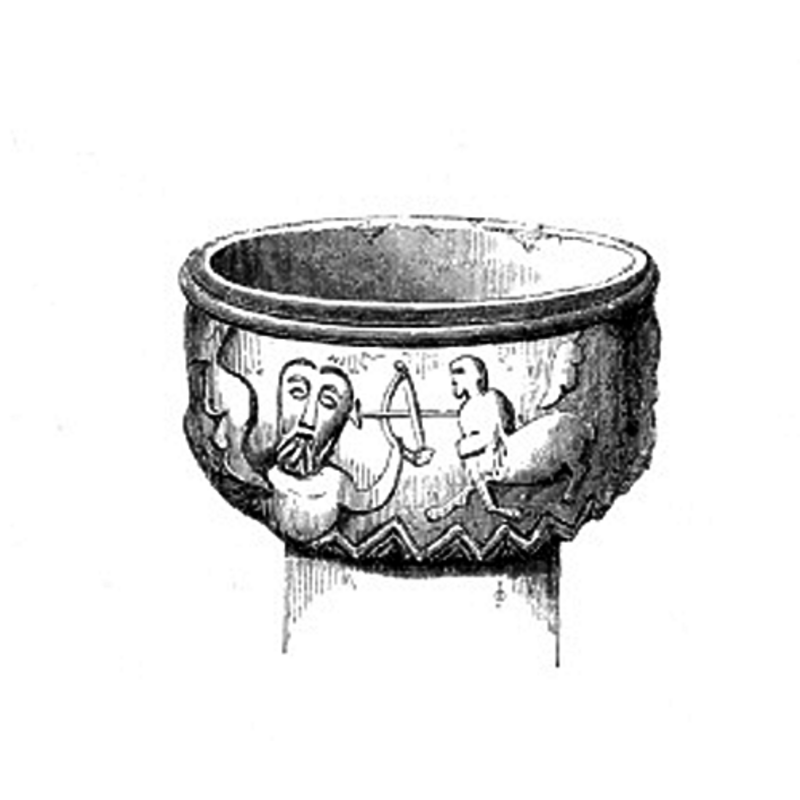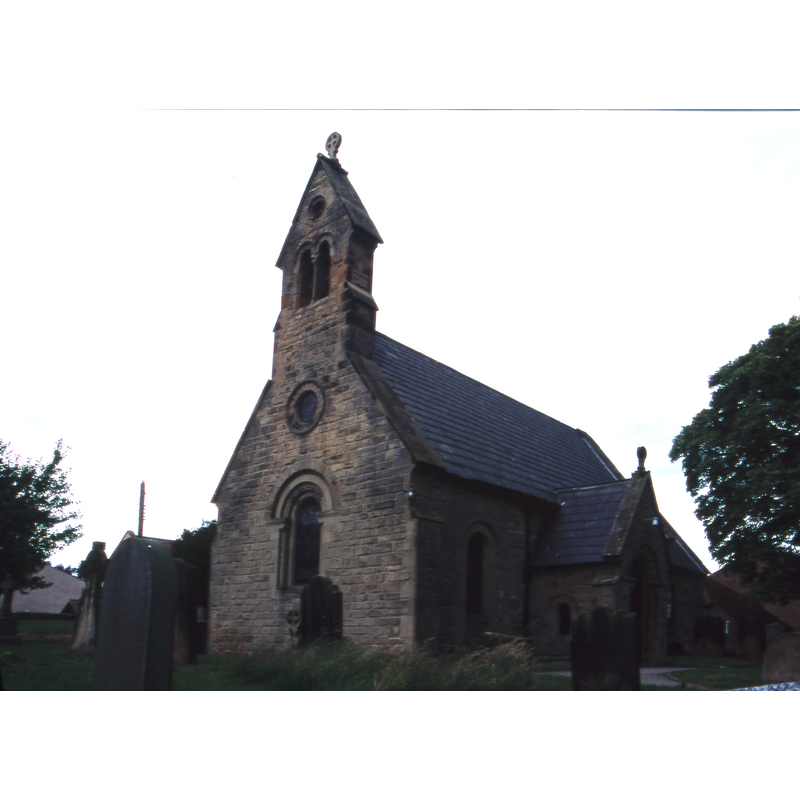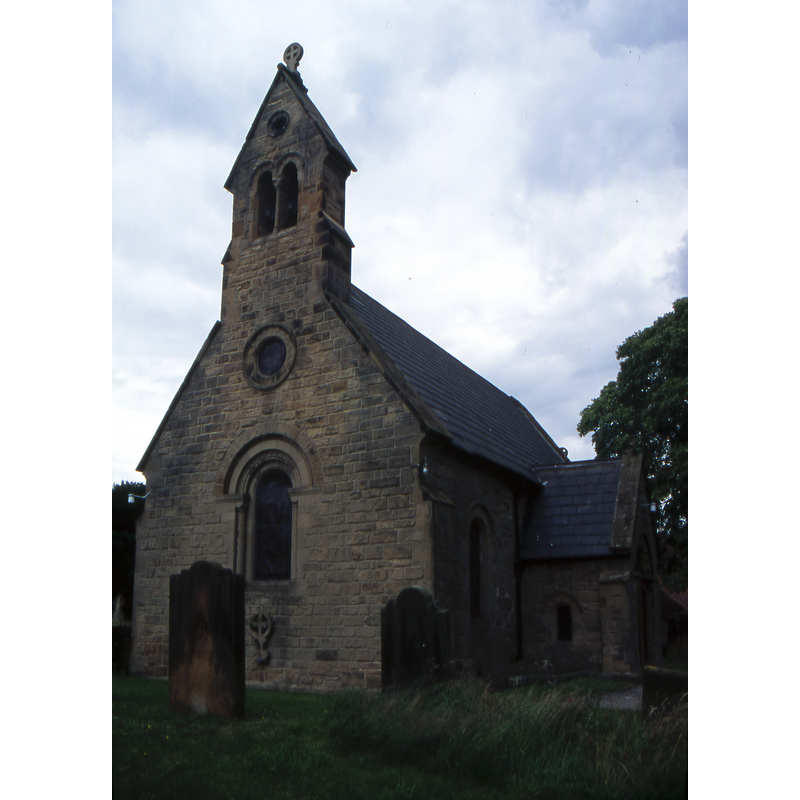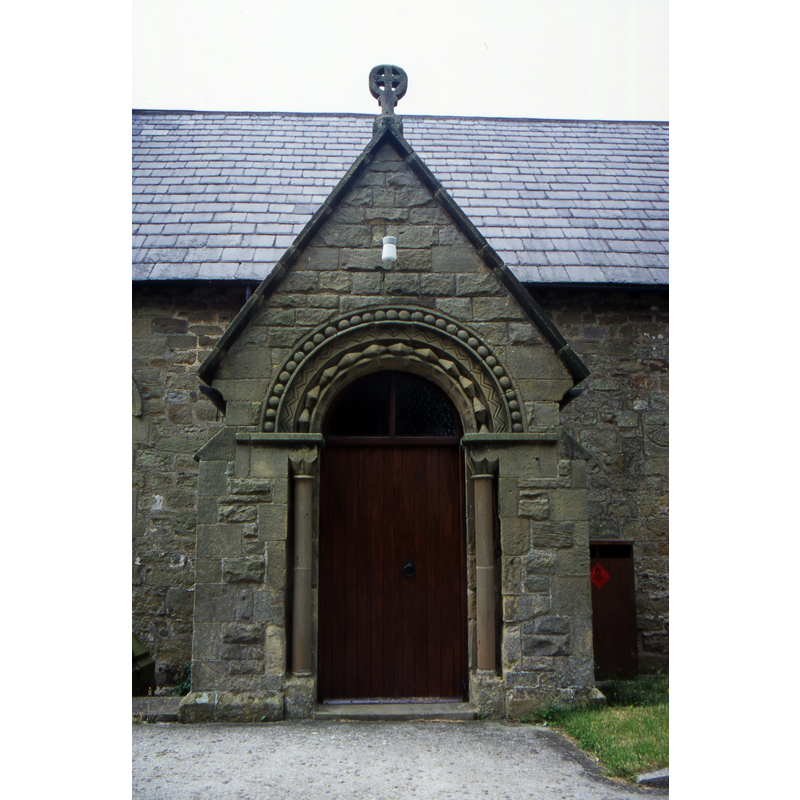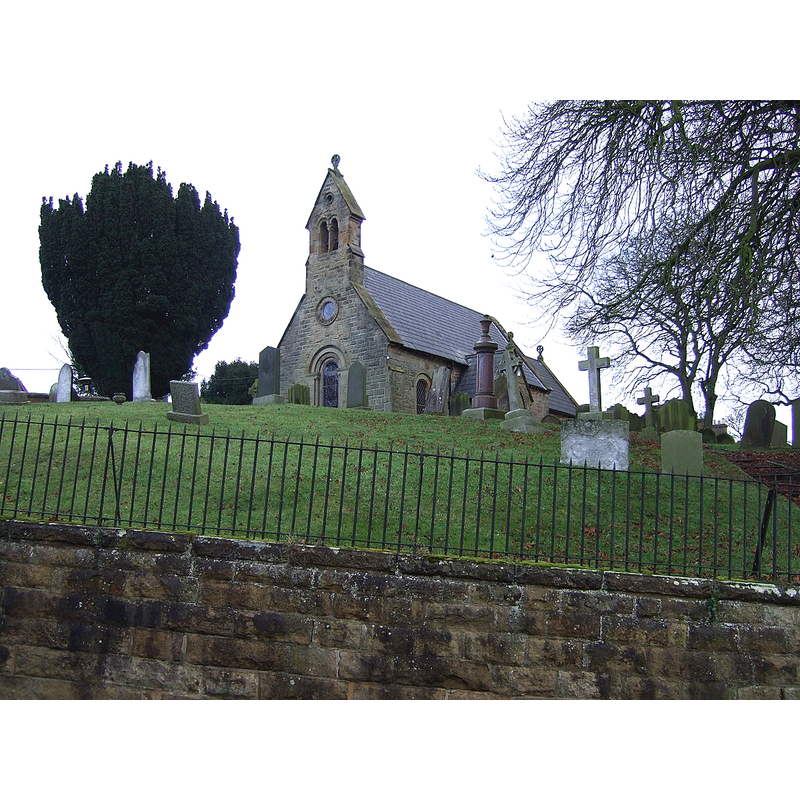West Rounton / Rongeston / Rungeton / Runtune
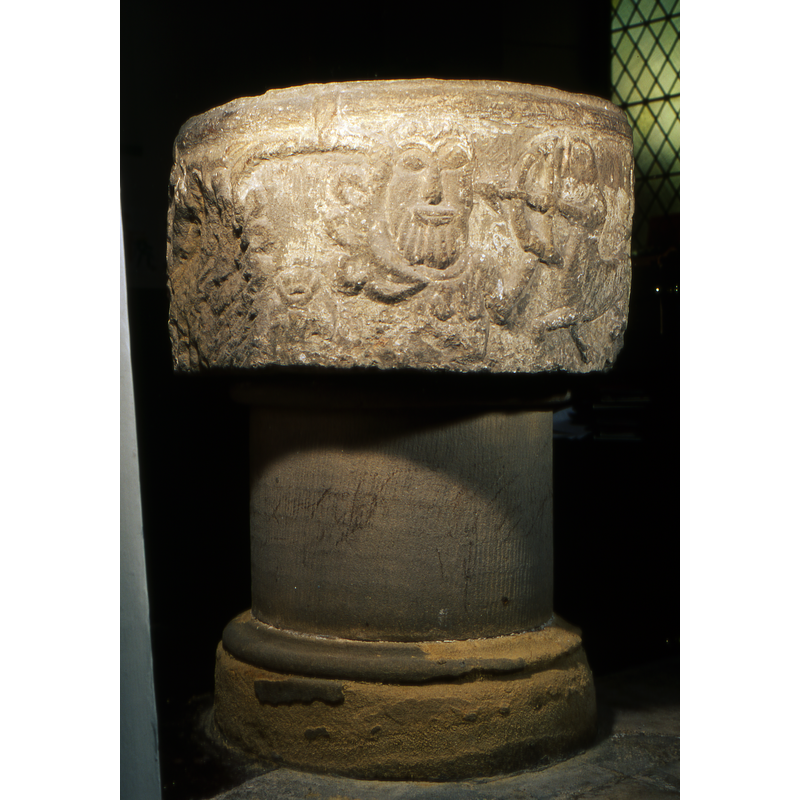
Image copyright © Baptisteria Sacra Index, 2023
CC-BY-NC-ND-4.0
Results: 15 records
B01: human figure - male - head - bearded
B02: animal - fabulous animal or monster - centaur - with bow and arrow
B03: design element - motifs - chevron
B04: design element - motifs - plant
B05: animal - mammal - lion - bi-corporate
BBU01: design element - patterns
view of font
view of font - elevation and plan
view of font
view of font
view of basin
view of church exterior - southwest view
view of church exterior - southwest view
view of church exterior - south porch
view of church exterior in context - southwest view
Copyright Statement: Image copyright © JThomas, 2013
Image Source: digital photograph taken 15 December 2012 by JThomas [www.geograph.org.uk/photo/3278738] [accessed 29 November 2019]
Copyright Instructions: CC-BY-SA-2.0
INFORMATION
Font ID: 00323ROU
Object Type: Baptismal Font1
Date Visited: 2000-07-14
Font Century and Period/Style: 11th - 12th century, Norman
Church / Chapel Name: Parish Church of St. Oswald
Font Location in Church: Inside the church, at the W end, S side, just inside the S door
Church Patron Saint(s): St. Oswald of Nothumbria
Church Address: West Rounton, Northallerton DL6 2LL, UK -- Tel.: +44 1609 772436
Site Location: North Yorkshire, Yorkshire and the Humber, England, United Kingdom
Directions to Site: Located 2-3 km NE of Welbury, about 25 km SSW of Middlesbrough, W of the A19
Ecclesiastic Region: Diocese of York
Historical Region: Hundred of Allerton
Additional Comments: damaged font: only the battered basin remains now / re-cycled font (reversed and used as base for the pulpit) MUST USE
Font Notes:
Click to view
There is a multiple-place entry for [West] Rounton [variant spelling] in the Domesday survey [https://opendomesday.org/place/NZ4103/west-rounton/] [accessed 29 November 2019] but it mentions neither cleric nor church in it. A font here is noted, with an engraving by Orlando Jewitt, in Field (1867) [NB: Field's text on fonts had appeared originally in The Church Builder (no. 22, April 1867: 74) [The series of articles was reprinted in book form four years later], and (1871): "The Font at West Rounton, of which we have given an engraving, is one of many examples of this. The Centaur, the arrow from whose bow is just about to pierce the monster, probably represents the Deity conquering Satan, or perhaps the continual conflict of the baptized Christian against sin and Satan. The other figure may represent the Divine and human natures united in our Lord. This exceedingly curious Font was discovered during the recent restoration of the little Norman Church of West Rounton, Yorkshire. It was found under the pulpit, of which it formed the base, having been turned over so that the bowl rested on the floor, and so carefully plastered that there was no external indication of its original form. It has now been restored to its former position near the south-west door of the church." Described in Bulmer's Directory... (1890): "old font, which is supposed to be Saxon work". Listed in Cox & Harvey (1907) as a baptismal font of the Norman period ornamented with "rude carvings". Described in Bond (1908) as a baptismal font of the Norman period showing "a centaur with bow and arrow [...] shooting a man at short range". This font, says Bond (ibid.), "was found in 1860 upside down beneath the pulpit, which it helped to support." The entry for this parish in the Victoria County History (York North Riding, vol. 1, 1914) notes: "The earliest part of the present church dates from about 1150, and though the walls have been much rebuilt they follow the original lines. The only parts of the 12th-century church are the chancel arch and part of the south doorway. The rest is modern restoration of 1860 [...] The font is of 12th-century date, and is an unusually interesting one. Until the time of the restoration of the church it served as a base for the pulpit, being reversed so that the bowl rested on the floor. It was so covered with plaster that there was no external indication of its original form. When it was cleaned, the bowl, which is circular in plan, was found to be carved with some of the signs of the Zodiac, the Ram and the Bull and the Centaur with his bow and arrow shooting at a human figure with a radiant face, evidently representing the sun; below the top edge is a round mould with a zigzag ornament. It has been reset for use on a modern base and stem near the south doorway." In Morris (1931): "circular, early Norm[an] font, of unusual interest, with rude carving of centaur, etc." Pevsner (1985) describes this as "Norman [...], a puzzling piece, the iconography of which (as so often with Norman fonts and tympana) defeats research. The bowl is round and has, appart from crude zigzag, a big bearded face, a centaur shooting an arrow towards it (Saggitarius), and two affronted beasts with one human head in common." On-site notes: only the cylindrical basin remains of this Norman font; the carved iconographic program shows 1) large head of a man with either a vine or a serpent on the left side; 2) a centaur points its bow and arrow to the man's head in 1; 3) a vine or plant motif over a chevron motif; 4)two lion bodies share a single head [see also some Scandinavian and Norman fonts with this motif]. The basin is badly broken in some spots but still retains the original hinges for the cover on the upper rim; the damaged area, now facing the wall, may have had another head on it; the base and lower base appear modern. [Bond (ibid., p. 71) writes about a small fontlet "which, having been placed at the rim of the font for photographic purposes, has been supposed to be a hand font, intended to be carried to private houses where baptism was to be administered in emergency; for which purpose, however, it is far too heavy."] The entry for this church in Historic England [Listing NGR: NZ4139003409] notes: "Church. C12,almost completely rebuilt 1860 […] Font: C12. C19 plinth and round column, C12 round bowl with carving depicting a big bearded face, a centaur shooting an arrow towards it (sagittarius, and 2 affronted beasts with one human head in common)."
COORDINATES
UTM: 30U 606160 6031975
Latitude & Longitude (Decimal): 54.4244, -1.3637
Latitude & Longitude (DMS): 54° 25′ 27.84″ N, 1° 21′ 49.32″ W
MEDIUM AND MEASUREMENTS
Material: stone, limestone
Number of Pieces: three
Font Shape: cylindrical, mounted
Basin Interior Shape: round
Basin Exterior Shape: round
Drainage System: centre hole in basin
Drainage Notes: The drain hole is off centre; the base is modern.
Rim Thickness: 8-9 cm*
Diameter (inside rim): 61 cm*
Diameter (includes rim): 77 cm* / 79 cm**
Basin Depth: 33 cm*
Height of Basin Side: 42 cm* / 43 cm**
Basin Total Height: 42 cm*
Height of Base: 61 cm* (modern)
Font Height (less Plinth): 103 cm*
Notes on Measurements: * BSI on-site / **Alfie M. Alderson, 1996 (received via Paul Weightman)
REFERENCES
- Victoria County History [online], University of London, 1993-. URL: https://www.british-history.ac.uk.
- Bond, Francis, Fonts and Font Covers, London: Waterstone, 1985 c1908, p. 71, 183, 278
- Bulmer, T., History, Topography, and Directory of North Yorkshire, Comprising its Ancient and Modern History; [...], Preston: T. Bulmer & Co. (T. Snape & Co. Printers), 1890, p. 591
- Collins, Arthur H., "The iconography of Darenth font", 56 (1943), Archaeologia Cantiana, 1943, pp. 6-10; p. 9-10
- Cox, John Charles, English Church Furniture, New York: E.P. Dutton & Co., 1907, p. 230
- Drake, Colin Stuart, The Romanesque Fonts of Northern Europe and Scandinavia, Woodbridge, Suffolk: Boydell Press, 2002, p. 15 and pl. 20
- Field, Walter, Stones of the temple, or, Lessons from the fabric and furniture of the Church, London, Oxford and Cambridge: Rivingtons, 1871, p. 162 fn 74, and ill on p. 157
- Index of Medieval Art, The Index of Medieval Art, Index of Christian Art, Princeton, [s.d.]. URL: https://theindex.princeton.edu/.
- Morris, Joseph Ernest, The North Riding of Yorkshire, London: Methuen & Co., 1931, p. 40, 324
- Pevsner, Nikolaus, Yorkshire: the North Riding, Harmondsworth: Penguin Books, 1985 c1966, p. 35, 384
